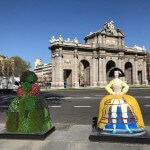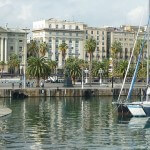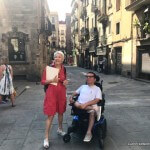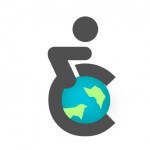Barcelona is a cosmopolitan city located in the northeastern region of Catalonia, in Spain. Known for its architecture, its nightlife and its seaside restaurants, this city is a must see during a visit to Spain. Here are the top five sites not to miss in Barcelona:
The Botanical Gardens
The city has a variety of parks worth visiting. Two of the most famous parks are the large Ciutadella Park and the Gaudí-designed Parc Güell. The Jardi Botànic, the city’s Botanical Gardens, are an oasis of tranquility located close to the city center. The park has an accessible toilet and electric scooters are available for rent, ideal for exploring this park, home to plants and flowers from all over the world.
Montjüic
An area you must not miss during your visit to Barcelona is the Montjuic. There are many ways to get to the top of this hill: most of the buses have ramps and the cable car has a separate access for wheelchair users. Known for its views towards the city and for its wide range of attractions, this neighbourhood can be visited all year round. Try to visit the Magic Fountain of Montjuic, a large fountain that offers shows filled with music, lights and color. The Palau Nacional, the National Palace, is another famous monument located in the area. It now houses the National Art Museum of Catalonia, a massive art gallery filled with Romanesque art and baroque exhibitions. The museum has several entrances for wheelchair users and platform lifts.
The Gothic Quarter
The Gothic Quarter is one of the city’s most famous places to visit. There are many inviting terraces, squares lined with Gothic buildings and churches to explore. The cobblestone streets make this area tricky to explore for wheelchair users. The situation is improving- two of the area’s most famous landmarks, the ancient Santa María del Mar Church and the Picasso Museum, have ramped entrances and lifts.
The Sagrada Familia
This unfinished cathedral designed by Gaudí is one of the city’s most famous symbols. The metro station nearest to this basilica is accessible, and there are several ramps that lead to the museum. The Passion façade, a façade decorated with carved sculptures of sombre saints, has a ramp leading to it, and there are adapted toilets at the end of the ramp. The Nativity façade, decorated with statues and sculpted flowers, is worth seeing, and you must not miss the inside of the cathedral, with its bony columns and its colourful windows.
La Rambla
La Rambla is Barcelona’s main street, located in the city center and reaching the sea. This street is lined with landmarks, including the Palau de la Virreina palace and the famous Boquería Market. There are plenty of cafés and flower stalls, and most of the boulevard is pedestrianized, making it easy to navigate with a wheelchair. All three metro stations located along the street are fully accessible: Plaça Catalunya station is located next to this popular meeting spot, Liceu is located halfway down next to many ancient buildings and Drassanes can be found next to the Mediterranean Sea.










I love Barcelona and your photos of the city are amazing! I even missed a couple of the suggestions you made, so I’ll have to go back. The Sagrada Familia is on the top of my list!
Brooke of Passport Couture recently posted…The 30 x 30 Capsule Wardrobe Challenge Finale